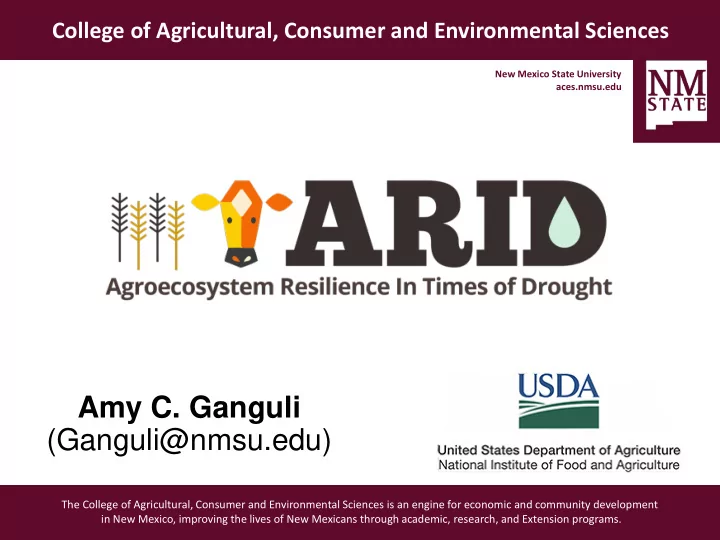

College of Agricultural, Consumer and Environmental Sciences New Mexico State University aces.nmsu.edu Amy C. Ganguli (Ganguli@nmsu.edu) The College of Agricultural, Consumer and Environmental Sciences is an engine for economic and community development New Mexico State University aces.nmsu.edu in New Mexico, improving the lives of New Mexicans through academic, research, and Extension programs.
Roadmap & Disclaimer Goal: Introduce a new USDA project addressing Disclaimer water and other agricultural production issues • Terminology review • Rationale • Project components
Agroecosystem Concept (Courtney White, 2010)
Resistance Photo Credit: Johnny Milano
Resilience Photo Credit: Christopher Hanewinckel
Resistance & Resilience Photo credit: Henry Phillips
Ecological Thresholds Image credit: www.sfnps.org Useful concept for designing adaptive strategies!
Agroecosystem Resilience “… the capacity of a system to adapt reorganize and maintain key functions in the case of turbulent and unpredictable change in its environment” -Casey Hoy
New Day New Story?
Issues: Drought and Climate Variability
Issues: Dwindling Groundwater • Groundwater in this region is highly variable • Tritium isotope measurements indicate groundwater recharge is rare and occurring primarily along shallow watercourses • Some towns (e.g., Clovis, NM) are facing harsh realities
Issues: Dwindling Groundwater • Some producers have experienced several wells and/or springs dry up • Wells can fluctuate up to 30- 40ft over 6 months due to high volume pumping • Some Producers have been forced to haul water, invest in new wells, switch practices, etc.
Issues: Changing Land Use and Land Cover NM TX (Vadjunec et al. 2018)
Putting Things into Perspective
Bottom up Approaches to Sustainable Agriculture Producer/Scientist Partnerships
The ARID Project Participatory approaches to Agroecosystem Resilience In times of Drought
The ARID Project Fact: short and long-term management strategies that are proactive rather than reactive are essential for maintaining ecological, social, and economic resilience.
The ARID Project Premise: sustainable management solutions are more effectively developed and more likely adopted using participatory approaches including citizen science.
The ARID Project • Integrated research and extension objectives • Builds on previous work • 5 Year project
ARID Multidisciplinary Team
The ARID Project Research Areas • Water (groundwater and precipitation monitoring) • Social Science & Policy • Land Use and Land Cover Change • Sustainable Agronomic Practices
The ARID Project Research Locations • 45 households in - Union County, NM - Cimarron, OK - Las Animas, CO • Sustainable ag. practices (Clovis, NM) • Potential expansion New Mexico State University aces.nmsu.edu
Citizen Science & Participatory Project Benefits • Fosters stakeholder and community engagement • Research contributions and discovery of new information • For change to take root it needs to happen from the top down
Groundwater Measurements • Static water levels (2x/year) • Tritium isotopes, general chemistry, and trace metals (yrs1 & yr3) • Select wells monitored for daily water level and temperature fluctuations • Aquifer mapping New Mexico State University aces.nmsu.edu
Precipitation Monitoring Isotope Analysis • Monthly (10 locations) • Visit poster #49 for more information Precipitation Quantity • CoCoRaHS citizen science (daily measurements), includes hail and snow
Poster #49 Victoria Blumenberg
Land Use & Land Cover Assessment Small Unmanned Aerial Systems • Quantify changes in (AKA Drones) sUAS land use and land cover spanning periods of prolonged drought • Document fine scale landscape dynamics to show how the landscape may be changing (e.g., woody plant encroachment) Photo credit: Austin Boardman
Social Science & Policy Components • Household decision making • Livelihood impacts and adaptation to drought • Gendered differences on drought perception and adaptation • Impacts of policy and associated communication on decision making
Sustainable Agricultural Practices Crop diversification • Farms in this region through cover cropping have been transitioning to dryland production where they face challenges due to water limitations, soil erosion, soil fertility depletion, and low productivity
Sustainable Agriculture Does this improve soil health and increase resilience?
ARID Outreach Model • Website: ARID.nmsu.edu • Fact Sheets or Extension Publications • Technical Publications and Reports • Presentations • Workshops • Social Media
ARID Social Media Twitter: Instagram: @AgroEcoResil @agroecoresilience
Bottom up Approaches to Sustainable Agriculture Producer/Scientist Partnerships New Mexico State University aces.nmsu.edu
College of Agricultural, Consumer and Environmental Sciences New Mexico State University Questions? aces.nmsu.edu The College of Agricultural, Consumer and Environmental Sciences is an engine for economic and community development New Mexico State University aces.nmsu.edu in New Mexico, improving the lives of New Mexicans through academic, research, and Extension programs.
Recommend
More recommend